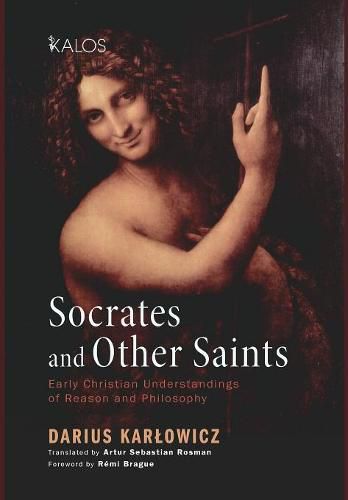Readings Newsletter
Become a Readings Member to make your shopping experience even easier.
Sign in or sign up for free!
You’re not far away from qualifying for FREE standard shipping within Australia
You’ve qualified for FREE standard shipping within Australia
The cart is loading…






This title is printed to order. This book may have been self-published. If so, we cannot guarantee the quality of the content. In the main most books will have gone through the editing process however some may not. We therefore suggest that you be aware of this before ordering this book. If in doubt check either the author or publisher’s details as we are unable to accept any returns unless they are faulty. Please contact us if you have any questions.
Many contemporary writers misunderstand early Christian views on philosophy because they identify the critical stances of the ante-Nicene fathers toward specific pagan philosophical schools with a general negative stance toward reason itself. Dariusz Karlowicz’s Socrates and Other Saints demonstrates why this identification is false. The question of the extent of humanity’s natural knowledge cannot be reduced to the question of faith’s relationship to the historical manifestations of philosophy among the Ancients. Karlowicz closely reads the writings of Justin Martyr, Tertullian, Clement of Alexandria, and others to demonstrate this point. He also builds upon Pierre Hadot’s thesis that ancient philosophy is not primarily theory but a
way of life
taught by sages, which aimed at happiness through participation in the divine. The fact that pagan philosophers falsely described humanity’s telos did not mean that the spiritual practices they developed could not be helpful in the Christian pilgrimage. As it turns out, the ancient Christian writers traditionally considered to be enemies of philosophy actually borrowed from her much more than we think–and perhaps more than they admitted.
$9.00 standard shipping within Australia
FREE standard shipping within Australia for orders over $100.00
Express & International shipping calculated at checkout
This title is printed to order. This book may have been self-published. If so, we cannot guarantee the quality of the content. In the main most books will have gone through the editing process however some may not. We therefore suggest that you be aware of this before ordering this book. If in doubt check either the author or publisher’s details as we are unable to accept any returns unless they are faulty. Please contact us if you have any questions.
Many contemporary writers misunderstand early Christian views on philosophy because they identify the critical stances of the ante-Nicene fathers toward specific pagan philosophical schools with a general negative stance toward reason itself. Dariusz Karlowicz’s Socrates and Other Saints demonstrates why this identification is false. The question of the extent of humanity’s natural knowledge cannot be reduced to the question of faith’s relationship to the historical manifestations of philosophy among the Ancients. Karlowicz closely reads the writings of Justin Martyr, Tertullian, Clement of Alexandria, and others to demonstrate this point. He also builds upon Pierre Hadot’s thesis that ancient philosophy is not primarily theory but a
way of life
taught by sages, which aimed at happiness through participation in the divine. The fact that pagan philosophers falsely described humanity’s telos did not mean that the spiritual practices they developed could not be helpful in the Christian pilgrimage. As it turns out, the ancient Christian writers traditionally considered to be enemies of philosophy actually borrowed from her much more than we think–and perhaps more than they admitted.